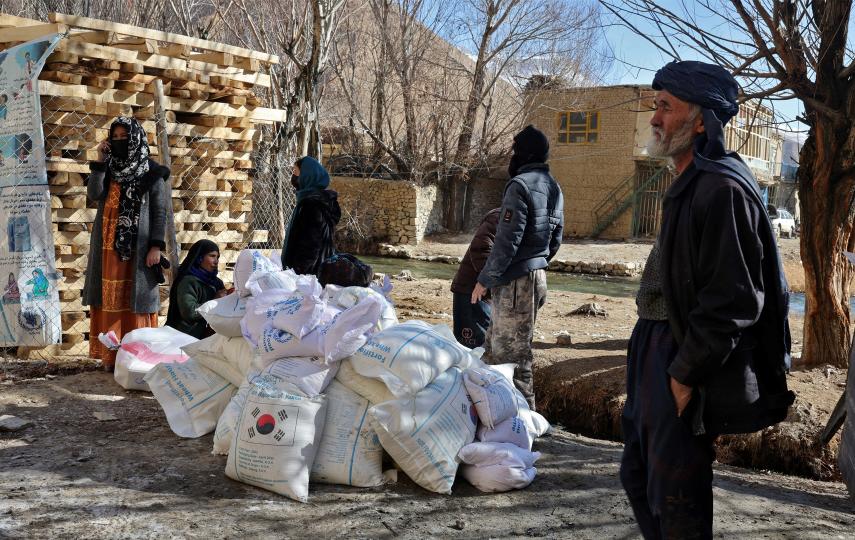Our editors’ weekly take on humanitarian news, trends, and developments from around the globe.
On our radar
Sinwar killed, Netanyahu says Gaza war won’t stop
A unit of Israeli soldiers unexpectedly encountered and killed Hamas leader Yahya Sinwar on 16 October in the southern Gaza Strip. Sinwar was widely believed to be the mastermind of Hamas’ 7 October attacks into Israel, which killed around 1,200 people, two thirds of them civilians, and resulted in the capture of 240 hostages. In a press conference, Israeli Prime Minister Benjamin Netanyahu said Sinwar’s death was “the beginning of the end” but that Israel “will not stop the war” in Gaza. US President Joe Biden and other Western leaders are now urging Netanyahu to make progress towards a ceasefire to end the more than year-long war Israel launched in response to Hamas’ attacks, laying waste to Gaza and brutalising its population. Netanyahu has resisted past calls for a ceasefire, and the US and other Western countries have been unwilling to use any significant diplomatic leverage to bring one about. On 15 October, the US warned Israel that it must increase the amount of humanitarian aid it is allowing into Gaza within 30 days or risk losing access to US weapons funding. The US has issued several similar warnings over the past year but has not followed through, while giving Israel at least $17.9 billion in military aid. Israel has been laying complete siege to the north of Gaza since the beginning of October, not allowing any food or other supplies into the area and raising concerns that it is trying to starve out some 400,000 Palestinians. For a glimpse into how Palestinians in Gaza are supporting each other under unimaginable conditions, watch this video clip from poet and writer Nour ElAssy and read her first-person article:
Care under fire: Lebanon’s overwhelmed health system
Despite the events in Gaza, Israel’s bombardment and ground invasion of Lebanon continues to kill and wound civilians and aid workers, and the Lebanese government now estimates that 1.2 million people have been forcibly displaced. UNICEF says that number includes an estimated 400,000 children, many of whom are living in overcrowded shelters or other makeshift accommodation. The agency’s deputy executive director, Ted Chaiban, called the situation in Lebanon an “unfolding humanitarian catastrophe”. Lebanon’s healthcare system, which was already fragile due to the country’s economic collapse, is struggling to deal with a massive influx of casualties. Due to the bombs and the fighting in the south, hospitals are being evacuated or completely shut down just when people need them most. The World Health Organization said it had verified 23 attacks on healthcare in Lebanon since 17 September (the day Israel detonated pagers allegedly belonging to members of Hezbollah), leading to 72 deaths and 43 injuries of health workers and patients. Adding to the pressure, a new case of cholera has been confirmed in the country – the first since an outbreak that ended in June 2023.
DEC’s belated ‘Middle East’ appeal
After a failed August bid for a relief campaign over Gaza, the UK’s Disasters Emergency Committee has now kicked into action, launching a “Middle East Humanitarian Appeal”. It comes after the Israeli invasion of Lebanon, but will also respond to the long-running humanitarian crises in Gaza and the West Bank. The DEC is a grouping of 15 international aid charities, which work together with the UK’s major broadcasters for rapid, pooled fundraising in response to humanitarian crises. A previous effort to launch a DEC appeal for Gaza was said by NGO sources to have been blocked by the BBC, one of the UK’s main broadcasters. Appeals can go ahead without some broadcasters, as in 2009 when the BBC and Sky refused to air one for Gaza. A spokesperson told The New Humanitarian in August that launching in the “absence of a ceasefire would face too many risks and challenges to be a successful appeal”. Some aid workers remain concerned, both by the vague name for the appeal, and due to lingering questions over why it took a year to launch, as there is still, clearly, no ceasefire.
ICC prosecutor renews probe into DRC war crimes
International Criminal Court (ICC) prosecutor Karim Khan has renewed an investigation into alleged war crimes committed during the conflict in eastern Democratic Republic of the Congo (DRC) since 2022, he announced on 14 October. More than 7 million people have been displaced by fighting between over 100 armed groups vying for control of the area’s mineral and other resources, creating one of the world’s most severe humanitarian crises. The most prominent of these groups is the Rwanda-backed M23 militia. In August, fighting between rebels and government forces killed 16 civilians, violating a ceasefire agreement. Khan said the current fighting is related to the pattern of conflict affecting the region for two decades, allowing the recent allegations to be investigated as part of an ICC case opened in 2004. On 16 October, the World Food Programme said more than a million people in eastern DRC’s Ituri province are experiencing food insecurity – mainly women and children displaced by conflict. For more on the long-running conflict in DRC, read The New Humanitarian’s recent coverage here.
Debt and crises collide as World Bank, IMF meetings begin
The World Bank and International Monetary Fund annual meetings are set to kick off amid warnings of a looming donor funding crisis and record debt levels for countries battered by conflict and disasters. The 21-26 October meetings are a forum for policymakers to discuss economic challenges. Economic inequities are intertwined with today’s humanitarian crises. The world’s 26 lowest-income countries are “deeper in debt” than they’ve been in years, a World Bank analysis released before the meetings warned. They’re more vulnerable to disasters, the cost of adapting to climate change is higher, and many are snared in conflict, “yet international aid as a share of their GDP has dwindled to a two-decade low, forcing many to obtain financing on punishing terms”, the report said. Meanwhile, donor promises for major development, health, and climate funds could fall short in the coming months, the US-based Center for Global Development warned. It’s based on an analysis of current donor commitments and past funding to everything from the Global Fund and Gavi to new climate funds.
Reports flag the oversized impact conflict has on poverty and hunger
As the number of violent conflicts around the globe surges, two new reports highlight their terrible consequences. Research by the Africa Center for Strategic Studies has found that 80% of the 163 million Africans facing acute food insecurity (meaning their inability to consume adequate food is putting their lives or livelihoods in immediate danger) live in conflict-affected countries, with half concentrated in just three nations: Nigeria, Sudan, and the Democratic Republic of the Congo. The 2024 Global Multidimensional Poverty Index compiled by the United Nations Development Programme and Oxford Poverty and Human Development Initiative, meanwhile, underlines the role conflict plays as a driver of poverty. One fifth of the world’s 1.1 billion poor people live in war-impacted states, it says, adding that a combined total of 455 million people live in “countries experiencing war, fragility and/or low peacefulness”.
Weekend read
Peacekeeper sex abuse rife in Central African Republic as survivors stay silent
‘Victims are very afraid to talk about what they have experienced and don't know who to talk to.’
Women and local NGOs said they aren’t reporting cases because they fear reprisals or don’t know who to contact.
And finally…
The EU protests too much
Africans are apparently not showering the EU with the appropriate amount of recognition and gratitude, according to outgoing EU Commissioner for International Partnerships Jutta Urpilainen. In a recent interview, in the context of greater awareness for projects by others like China and the United States, Urpilainen said that “even though [the EU has] been one of the biggest donors in many of our partner countries – for instance, in Africa – the citizens in those countries do not recognise that”. It is an old gripe. Last year, Josep Borrell, the EU’s foreign policy chief, complained that “sometimes you get the impression that everything that the EU does is taken for granted”. Of course, the extraction of wealth from Africa during the colonial period and beyond is rarely mentioned. Nor is the irony that the EU, or at least its predecessor, the European Economic Community, was set up partly as a mechanism to allow for access to African resources, with three quarters of its territory lying outside Europe. So who, in fact, is it that should be showing gratitude to whom?




